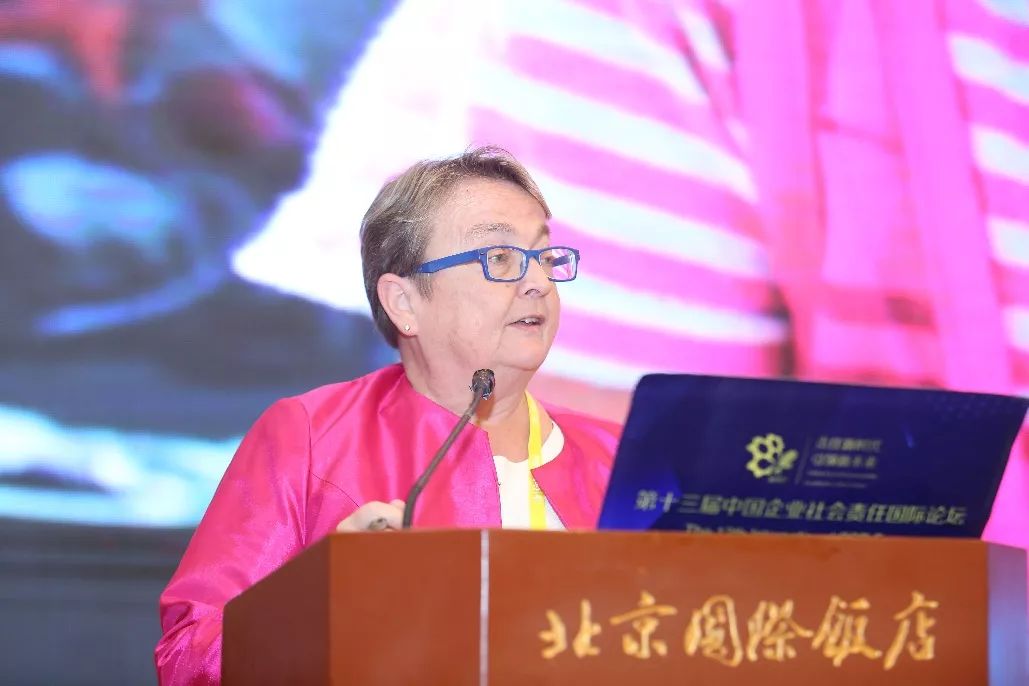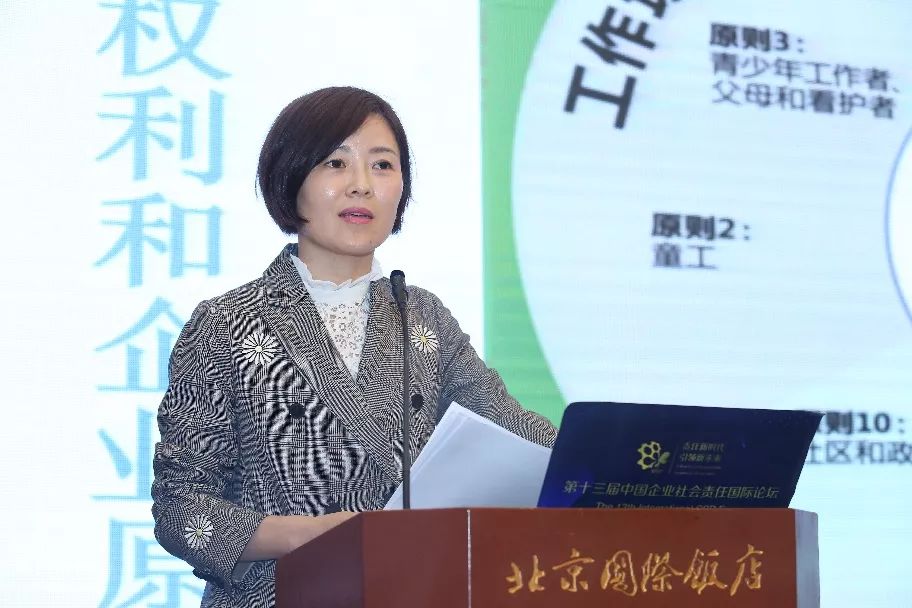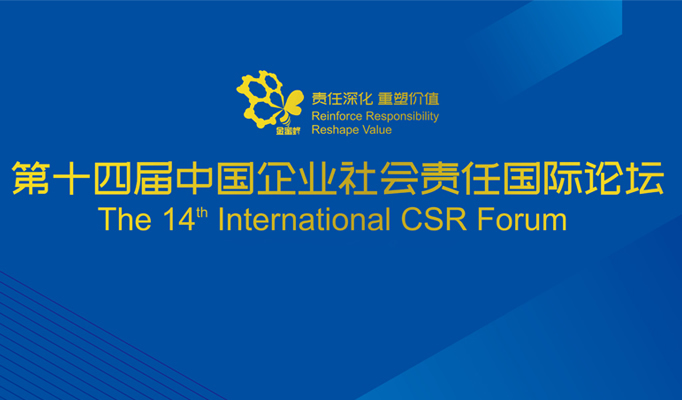Good Business Practice from a Child Rights Perspective
2018-06-26GoldenBeeadmin0010

It is every business' responsibility to protect child rights. How can businesses see their impacts on children? What should they do to truly integrate child rights with their daily operation?
On June 5, China WTO Tribune and UNICEF co-hosted a forum themed "Good Business Practice from a Child Rights Perspective" at Beijing International Hotel. In the forum, experts from UNICEF and representatives from CCR CSR, State Grid Beijing Electric Power Company, Visa China, and JD Group discussed how to protect child rights in corporate operation.
Wivina Belmonte, Deputy Regional Director of UNICEF East Asia and Pacific Region Office, stressed in her opening remarks that focusing on child rights is an investment rather than a cost for businesses.
By caring for children, businesses can benefit from improved access to skilled labor, improved employee satisfaction, improve the communities in which they based, and raise their brand value. Being a more responsible and sustainable business is one of the best investments of a company. Purpose and profit are not mutually exclusive.

Wivina Belmonte, Deputy Regional Director of UNICEF East Asia and Pacific Region Office
Cheng Jin, CSR specialist of UNICEF China, gave a keynote speech: How companies include child rights in operation – Introduction of assessment tools and action guide.
"UNICEF has been considering how to work with businesses and help them show more respect for child rights in operation, so that they can be the supporter and advocators of child rights", Cheng said. To that end, UNICEF developed a series of tools and guides. For instance,
· Children’s Rights in Impact Assessments guides businesses in how to incorporate child rights in business impact assessment and take actions.
· Children’s Rights in Policies and Codes of Conduct recommends methods for businesses to incorporate child rights in their policies and codes of conduct.
· Engaging Stakeholders on Children’s rights helps businesses understand why and how to work with the stakeholders.
· Children’s Rights in Sustainability Reporting is a guidebook on how to incorporate child rights in the GRI report.
· Children Are Everyone's Business - Workbook 2.0 is a guidebook that summarizes all UNICEF tools related with child rights.

Cheng Jin, CSR Specialists of UNICEF China
In the panel discussion, the moderator, Ms. Lin Bo, Deputy General Manager of GoldenBee CSR Consulting invited panelists to exchange views on how to integrate child rights with corporate operation and share their practices in this regard.

➤ As an expert of a professional consulting organization, Ines Kaempfer, Executive Director of CCR CSR, has been engaged in CSR and supply chain management in the past decade, focusing on children's rights and labor rights in the manufacturing and textile industries of China and Southeast Asian countries.
She mentioned that with the CSR development in recent years, supply chain management has made progress, and many businesses include human rights and working time in supplier assessment, but very few of them take child rights protection as part of the assessment. Therefore, all parties should make concerted efforts to call more attention from the businesses to child rights.
➤ Li Chao, Deputy Chief Editor of Media Business of State Grid Beijing Electric Power Company, is one of the founders of State Grid's famous charity program "Power Love Classroom." She shared the three development stages of the charity program of Beijing Electric Power Company: the stage of donation; the stage of providing power service to school and classroom; and the current stage of "Power Love Classroom" charity brand. The company has explored a sustainable way to combine its power business with charity.
She pointed out that one-time donation was simple. Any company with the financial capability and the will can do that, and it is helpful for the children too, but it isn't sustainable. Only by combining your business and professional advantages with the children's real needs can you bring continuous benefits to children, and that's what a good charity program should do.
➤ As the Head of Financial Inclusion and Education of Visa China, Wang Dong shared how Visa provided children, youngsters, education professionals, banks, and the government with the tools and resources they need in ways that are both entertaining and instructive, carried out financial literacy education, helped individuals and groups learn wealth management skills, and fostered responsible financial consumers. Visa believes that by learning financial knowledge, people can well manage their wealth and use financial tools and services, which can improve the quality of life.
Wang Dong pointed out that one company alone cannot protect child rights. It takes the concerted efforts of all parties. Visa has studied, advocated, innovated, planned, and organized all kinds of financial education activities and developed relevant contents in conjunction with government agencies, educational organizations, financial service institutions, non-profit organizations, and the media.
➤ Ma Libo, Head of JD CSR Department and Secretary General of JD Foundation said that donating money is not the only way to improve children’s welfare. What's more important is leveraging on the business' advantages. JD's advantage lies in its online platform that covers 900 million users and 170,000 suppliers. JD has joined hands with private partners to launch programs such as "JD Charity Online Donation Platform," toy recycling, and children's book donation, pushed them to the 900 million users and delivered the materials to children who really need them through its efficient and convenient logistics network, thus benefiting more children.
At the same time, JD has built its own kindergarten, day care center, and children's playground, introduced quality educational resources, and launched the "Spend Spring Festival at JD" program, showing its care for the employees and their children.
➤ Cheng Jin from the UNICEF China said that business pioneers are the best advocators for protecting child rights. More and more pioneers have taken action and had good practices. In the future, UNICEF will work with businesses more closely and urge more of them to integrate child rights with corporate operation.
For more information about child rights and CSR, please see the webpage of "child rights and businesses" set by GoldenBee and UNICEF.
Scan QR code to view the webpage:

Best Practices
- Beijing Public Transportation Corporation: Developing green transportation to build a harmonious and livable capital
- CGN: Building a modern factory in barren deserts and developing a new win-win cooperation model along “Belt and Road”
- Guangzhou Huasheng Enterprise Management Service Co., Ltd.: Transparent services for reshaping the automobile service market
Upcoming Event

All the materials on the site “Source: XXX (not from this site)” have been reprinted from other media. They do not imply the agreement by the site.
All the materials with “Source: CSR-China Website” are the copyright of CSR-China Website. None of them may be used in any form or by any means without permission from CSR-China Website.
GoldenBee Official WeChat
Copyright © Csr-china.net All Right Reserved.
京ICP备13041808号-3












